Law of Tort: Analysis of Nuisance, Rylands v Fletcher, and Defamation
VerifiedAdded on 2021/01/02
|11
|3895
|465
Report
AI Summary
This report provides a comprehensive analysis of tort law, focusing on three key areas: nuisance, liability under Rylands v Fletcher, and defamation. The report begins with an introduction to tort law, defining it as a civil wrong causing harm and outlining the potential liabilities. The main body of the report delves into the specific torts, starting with nuisance, examining the distinction between public and private nuisance, and applying these concepts to a case involving a pig farm causing noise and odor issues. The second section explores the Rylands v Fletcher principle of strict liability, analyzing a case where pesticides stored by a farm owner damage a neighbor's plants due to a storm. The report then examines defamation, including slander, in a case involving Andrew and Lucas, and the moral defamation caused by Andrew. Each section includes relevant case law and application to the given scenarios. The report concludes with a summary of the findings and the legal implications of each case, providing advice on the outcomes.
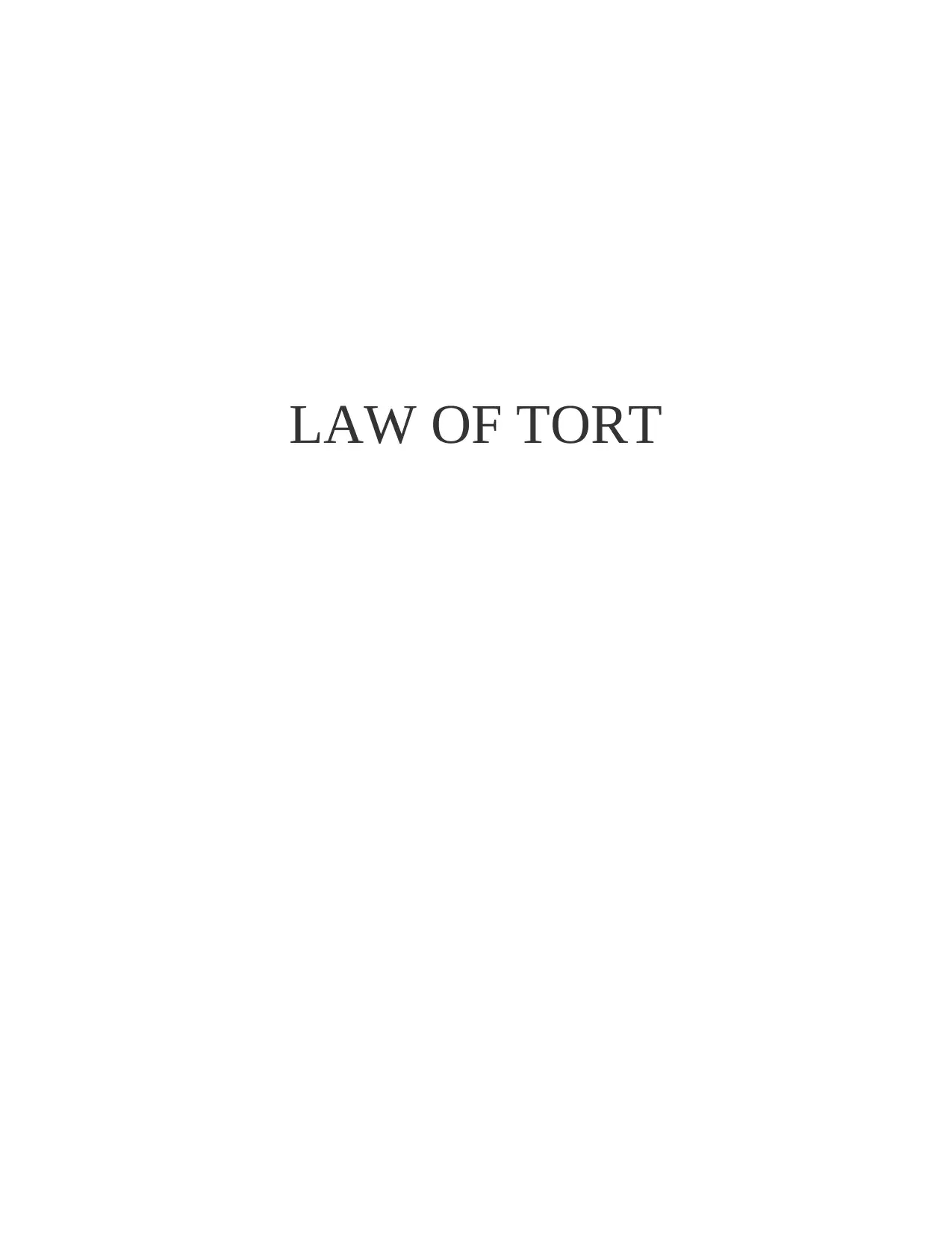
LAW OF TORT
Paraphrase This Document
Need a fresh take? Get an instant paraphrase of this document with our AI Paraphraser
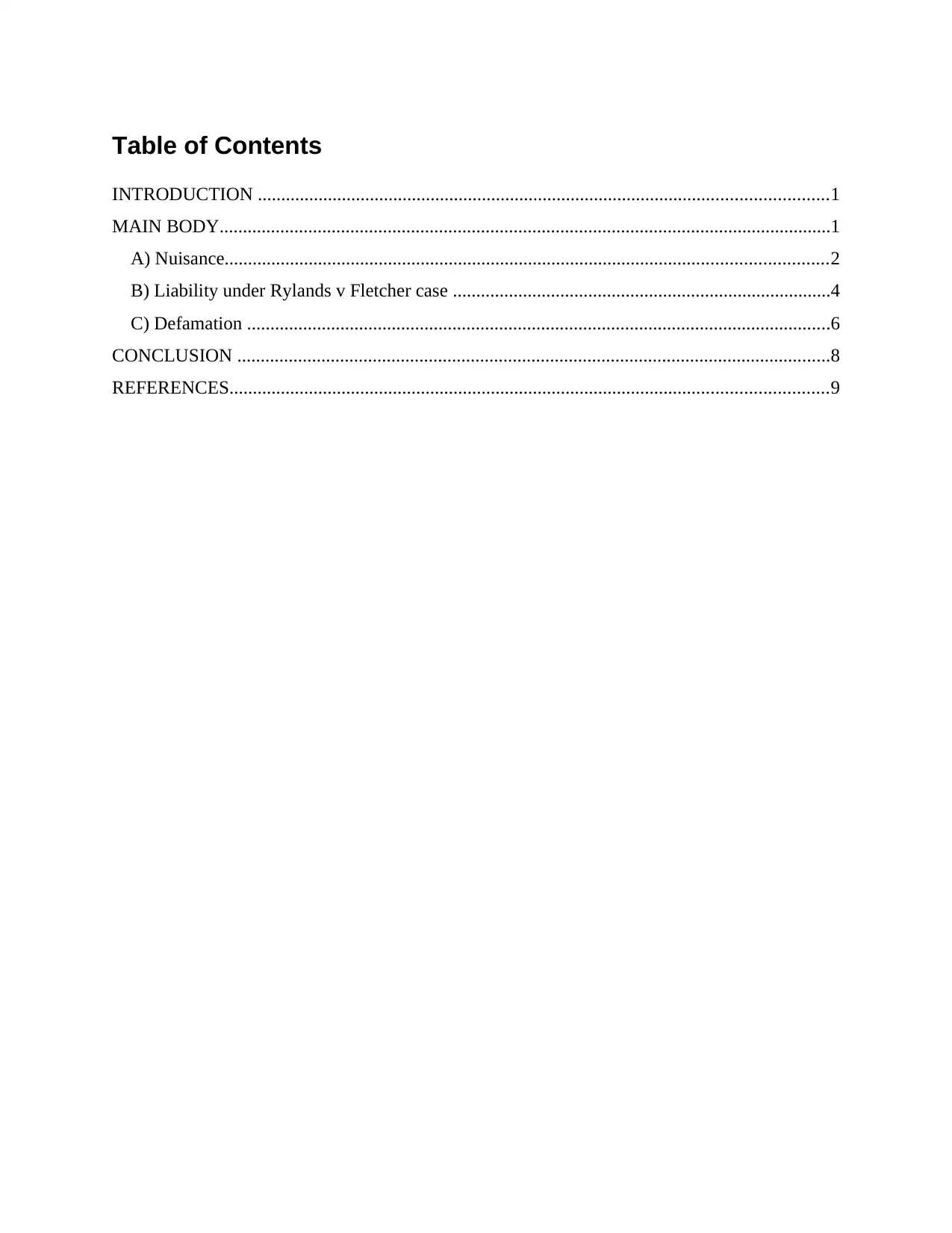
Table of Contents
INTRODUCTION ..........................................................................................................................1
MAIN BODY...................................................................................................................................1
A) Nuisance.................................................................................................................................2
B) Liability under Rylands v Fletcher case .................................................................................4
C) Defamation .............................................................................................................................6
CONCLUSION ...............................................................................................................................8
REFERENCES................................................................................................................................9
INTRODUCTION ..........................................................................................................................1
MAIN BODY...................................................................................................................................1
A) Nuisance.................................................................................................................................2
B) Liability under Rylands v Fletcher case .................................................................................4
C) Defamation .............................................................................................................................6
CONCLUSION ...............................................................................................................................8
REFERENCES................................................................................................................................9
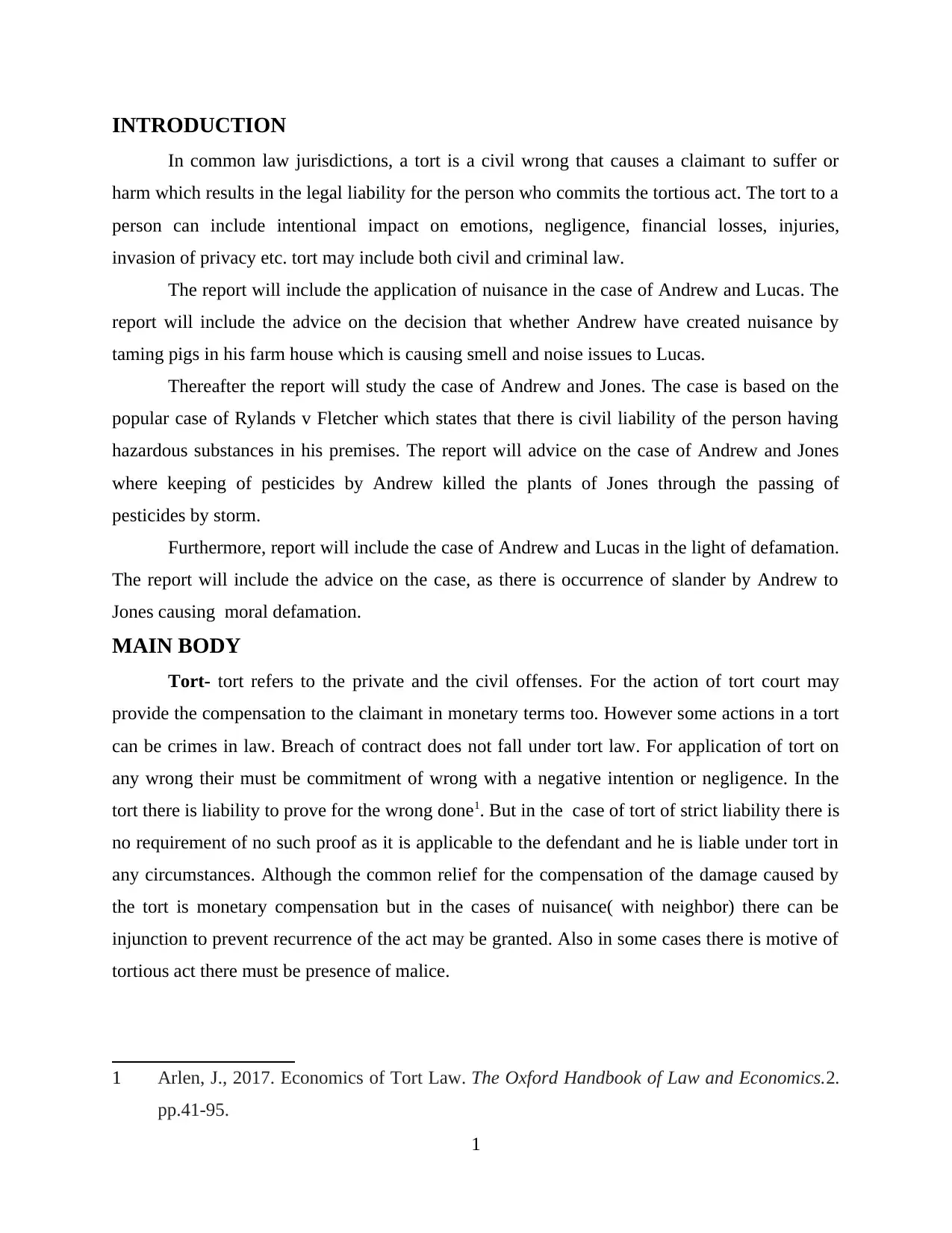
INTRODUCTION
In common law jurisdictions, a tort is a civil wrong that causes a claimant to suffer or
harm which results in the legal liability for the person who commits the tortious act. The tort to a
person can include intentional impact on emotions, negligence, financial losses, injuries,
invasion of privacy etc. tort may include both civil and criminal law.
The report will include the application of nuisance in the case of Andrew and Lucas. The
report will include the advice on the decision that whether Andrew have created nuisance by
taming pigs in his farm house which is causing smell and noise issues to Lucas.
Thereafter the report will study the case of Andrew and Jones. The case is based on the
popular case of Rylands v Fletcher which states that there is civil liability of the person having
hazardous substances in his premises. The report will advice on the case of Andrew and Jones
where keeping of pesticides by Andrew killed the plants of Jones through the passing of
pesticides by storm.
Furthermore, report will include the case of Andrew and Lucas in the light of defamation.
The report will include the advice on the case, as there is occurrence of slander by Andrew to
Jones causing moral defamation.
MAIN BODY
Tort- tort refers to the private and the civil offenses. For the action of tort court may
provide the compensation to the claimant in monetary terms too. However some actions in a tort
can be crimes in law. Breach of contract does not fall under tort law. For application of tort on
any wrong their must be commitment of wrong with a negative intention or negligence. In the
tort there is liability to prove for the wrong done1. But in the case of tort of strict liability there is
no requirement of no such proof as it is applicable to the defendant and he is liable under tort in
any circumstances. Although the common relief for the compensation of the damage caused by
the tort is monetary compensation but in the cases of nuisance( with neighbor) there can be
injunction to prevent recurrence of the act may be granted. Also in some cases there is motive of
tortious act there must be presence of malice.
1 Arlen, J., 2017. Economics of Tort Law. The Oxford Handbook of Law and Economics.2.
pp.41-95.
1
In common law jurisdictions, a tort is a civil wrong that causes a claimant to suffer or
harm which results in the legal liability for the person who commits the tortious act. The tort to a
person can include intentional impact on emotions, negligence, financial losses, injuries,
invasion of privacy etc. tort may include both civil and criminal law.
The report will include the application of nuisance in the case of Andrew and Lucas. The
report will include the advice on the decision that whether Andrew have created nuisance by
taming pigs in his farm house which is causing smell and noise issues to Lucas.
Thereafter the report will study the case of Andrew and Jones. The case is based on the
popular case of Rylands v Fletcher which states that there is civil liability of the person having
hazardous substances in his premises. The report will advice on the case of Andrew and Jones
where keeping of pesticides by Andrew killed the plants of Jones through the passing of
pesticides by storm.
Furthermore, report will include the case of Andrew and Lucas in the light of defamation.
The report will include the advice on the case, as there is occurrence of slander by Andrew to
Jones causing moral defamation.
MAIN BODY
Tort- tort refers to the private and the civil offenses. For the action of tort court may
provide the compensation to the claimant in monetary terms too. However some actions in a tort
can be crimes in law. Breach of contract does not fall under tort law. For application of tort on
any wrong their must be commitment of wrong with a negative intention or negligence. In the
tort there is liability to prove for the wrong done1. But in the case of tort of strict liability there is
no requirement of no such proof as it is applicable to the defendant and he is liable under tort in
any circumstances. Although the common relief for the compensation of the damage caused by
the tort is monetary compensation but in the cases of nuisance( with neighbor) there can be
injunction to prevent recurrence of the act may be granted. Also in some cases there is motive of
tortious act there must be presence of malice.
1 Arlen, J., 2017. Economics of Tort Law. The Oxford Handbook of Law and Economics.2.
pp.41-95.
1
⊘ This is a preview!⊘
Do you want full access?
Subscribe today to unlock all pages.

Trusted by 1+ million students worldwide
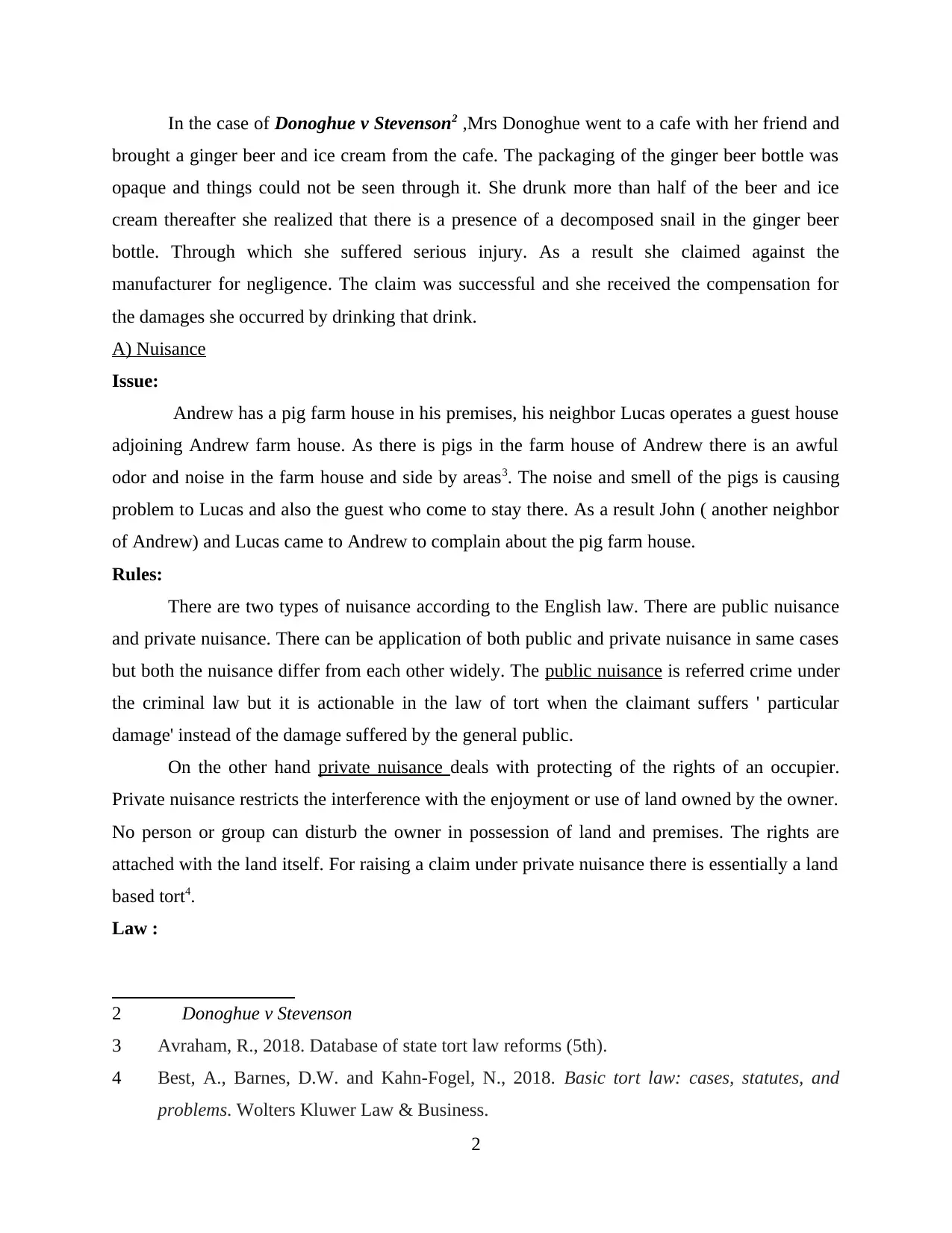
In the case of Donoghue v Stevenson2 ,Mrs Donoghue went to a cafe with her friend and
brought a ginger beer and ice cream from the cafe. The packaging of the ginger beer bottle was
opaque and things could not be seen through it. She drunk more than half of the beer and ice
cream thereafter she realized that there is a presence of a decomposed snail in the ginger beer
bottle. Through which she suffered serious injury. As a result she claimed against the
manufacturer for negligence. The claim was successful and she received the compensation for
the damages she occurred by drinking that drink.
A) Nuisance
Issue:
Andrew has a pig farm house in his premises, his neighbor Lucas operates a guest house
adjoining Andrew farm house. As there is pigs in the farm house of Andrew there is an awful
odor and noise in the farm house and side by areas3. The noise and smell of the pigs is causing
problem to Lucas and also the guest who come to stay there. As a result John ( another neighbor
of Andrew) and Lucas came to Andrew to complain about the pig farm house.
Rules:
There are two types of nuisance according to the English law. There are public nuisance
and private nuisance. There can be application of both public and private nuisance in same cases
but both the nuisance differ from each other widely. The public nuisance is referred crime under
the criminal law but it is actionable in the law of tort when the claimant suffers ' particular
damage' instead of the damage suffered by the general public.
On the other hand private nuisance deals with protecting of the rights of an occupier.
Private nuisance restricts the interference with the enjoyment or use of land owned by the owner.
No person or group can disturb the owner in possession of land and premises. The rights are
attached with the land itself. For raising a claim under private nuisance there is essentially a land
based tort4.
Law :
2 Donoghue v Stevenson
3 Avraham, R., 2018. Database of state tort law reforms (5th).
4 Best, A., Barnes, D.W. and Kahn-Fogel, N., 2018. Basic tort law: cases, statutes, and
problems. Wolters Kluwer Law & Business.
2
brought a ginger beer and ice cream from the cafe. The packaging of the ginger beer bottle was
opaque and things could not be seen through it. She drunk more than half of the beer and ice
cream thereafter she realized that there is a presence of a decomposed snail in the ginger beer
bottle. Through which she suffered serious injury. As a result she claimed against the
manufacturer for negligence. The claim was successful and she received the compensation for
the damages she occurred by drinking that drink.
A) Nuisance
Issue:
Andrew has a pig farm house in his premises, his neighbor Lucas operates a guest house
adjoining Andrew farm house. As there is pigs in the farm house of Andrew there is an awful
odor and noise in the farm house and side by areas3. The noise and smell of the pigs is causing
problem to Lucas and also the guest who come to stay there. As a result John ( another neighbor
of Andrew) and Lucas came to Andrew to complain about the pig farm house.
Rules:
There are two types of nuisance according to the English law. There are public nuisance
and private nuisance. There can be application of both public and private nuisance in same cases
but both the nuisance differ from each other widely. The public nuisance is referred crime under
the criminal law but it is actionable in the law of tort when the claimant suffers ' particular
damage' instead of the damage suffered by the general public.
On the other hand private nuisance deals with protecting of the rights of an occupier.
Private nuisance restricts the interference with the enjoyment or use of land owned by the owner.
No person or group can disturb the owner in possession of land and premises. The rights are
attached with the land itself. For raising a claim under private nuisance there is essentially a land
based tort4.
Law :
2 Donoghue v Stevenson
3 Avraham, R., 2018. Database of state tort law reforms (5th).
4 Best, A., Barnes, D.W. and Kahn-Fogel, N., 2018. Basic tort law: cases, statutes, and
problems. Wolters Kluwer Law & Business.
2
Paraphrase This Document
Need a fresh take? Get an instant paraphrase of this document with our AI Paraphraser
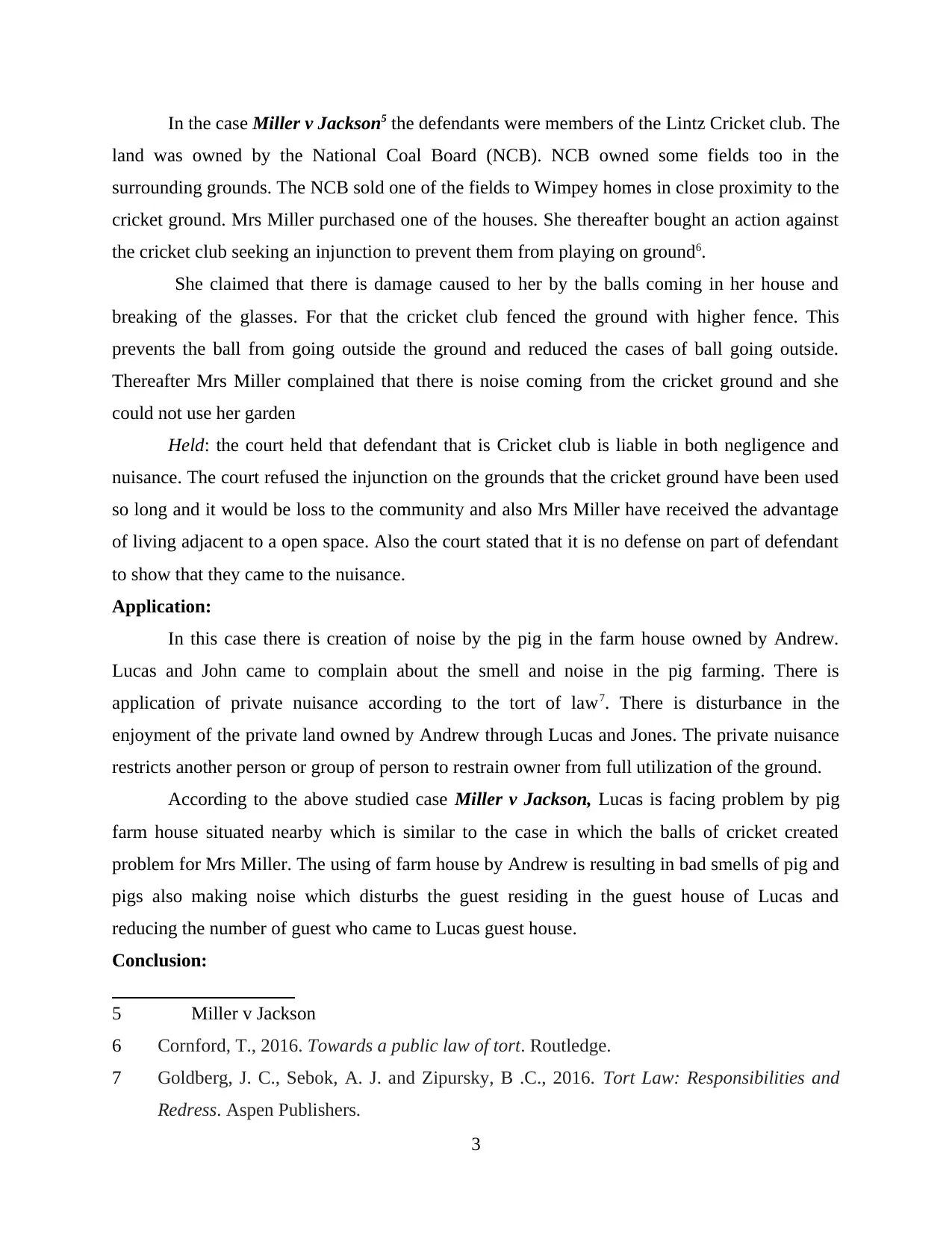
In the case Miller v Jackson5 the defendants were members of the Lintz Cricket club. The
land was owned by the National Coal Board (NCB). NCB owned some fields too in the
surrounding grounds. The NCB sold one of the fields to Wimpey homes in close proximity to the
cricket ground. Mrs Miller purchased one of the houses. She thereafter bought an action against
the cricket club seeking an injunction to prevent them from playing on ground6.
She claimed that there is damage caused to her by the balls coming in her house and
breaking of the glasses. For that the cricket club fenced the ground with higher fence. This
prevents the ball from going outside the ground and reduced the cases of ball going outside.
Thereafter Mrs Miller complained that there is noise coming from the cricket ground and she
could not use her garden
Held: the court held that defendant that is Cricket club is liable in both negligence and
nuisance. The court refused the injunction on the grounds that the cricket ground have been used
so long and it would be loss to the community and also Mrs Miller have received the advantage
of living adjacent to a open space. Also the court stated that it is no defense on part of defendant
to show that they came to the nuisance.
Application:
In this case there is creation of noise by the pig in the farm house owned by Andrew.
Lucas and John came to complain about the smell and noise in the pig farming. There is
application of private nuisance according to the tort of law7. There is disturbance in the
enjoyment of the private land owned by Andrew through Lucas and Jones. The private nuisance
restricts another person or group of person to restrain owner from full utilization of the ground.
According to the above studied case Miller v Jackson, Lucas is facing problem by pig
farm house situated nearby which is similar to the case in which the balls of cricket created
problem for Mrs Miller. The using of farm house by Andrew is resulting in bad smells of pig and
pigs also making noise which disturbs the guest residing in the guest house of Lucas and
reducing the number of guest who came to Lucas guest house.
Conclusion:
5 Miller v Jackson
6 Cornford, T., 2016. Towards a public law of tort. Routledge.
7 Goldberg, J. C., Sebok, A. J. and Zipursky, B .C., 2016. Tort Law: Responsibilities and
Redress. Aspen Publishers.
3
land was owned by the National Coal Board (NCB). NCB owned some fields too in the
surrounding grounds. The NCB sold one of the fields to Wimpey homes in close proximity to the
cricket ground. Mrs Miller purchased one of the houses. She thereafter bought an action against
the cricket club seeking an injunction to prevent them from playing on ground6.
She claimed that there is damage caused to her by the balls coming in her house and
breaking of the glasses. For that the cricket club fenced the ground with higher fence. This
prevents the ball from going outside the ground and reduced the cases of ball going outside.
Thereafter Mrs Miller complained that there is noise coming from the cricket ground and she
could not use her garden
Held: the court held that defendant that is Cricket club is liable in both negligence and
nuisance. The court refused the injunction on the grounds that the cricket ground have been used
so long and it would be loss to the community and also Mrs Miller have received the advantage
of living adjacent to a open space. Also the court stated that it is no defense on part of defendant
to show that they came to the nuisance.
Application:
In this case there is creation of noise by the pig in the farm house owned by Andrew.
Lucas and John came to complain about the smell and noise in the pig farming. There is
application of private nuisance according to the tort of law7. There is disturbance in the
enjoyment of the private land owned by Andrew through Lucas and Jones. The private nuisance
restricts another person or group of person to restrain owner from full utilization of the ground.
According to the above studied case Miller v Jackson, Lucas is facing problem by pig
farm house situated nearby which is similar to the case in which the balls of cricket created
problem for Mrs Miller. The using of farm house by Andrew is resulting in bad smells of pig and
pigs also making noise which disturbs the guest residing in the guest house of Lucas and
reducing the number of guest who came to Lucas guest house.
Conclusion:
5 Miller v Jackson
6 Cornford, T., 2016. Towards a public law of tort. Routledge.
7 Goldberg, J. C., Sebok, A. J. and Zipursky, B .C., 2016. Tort Law: Responsibilities and
Redress. Aspen Publishers.
3
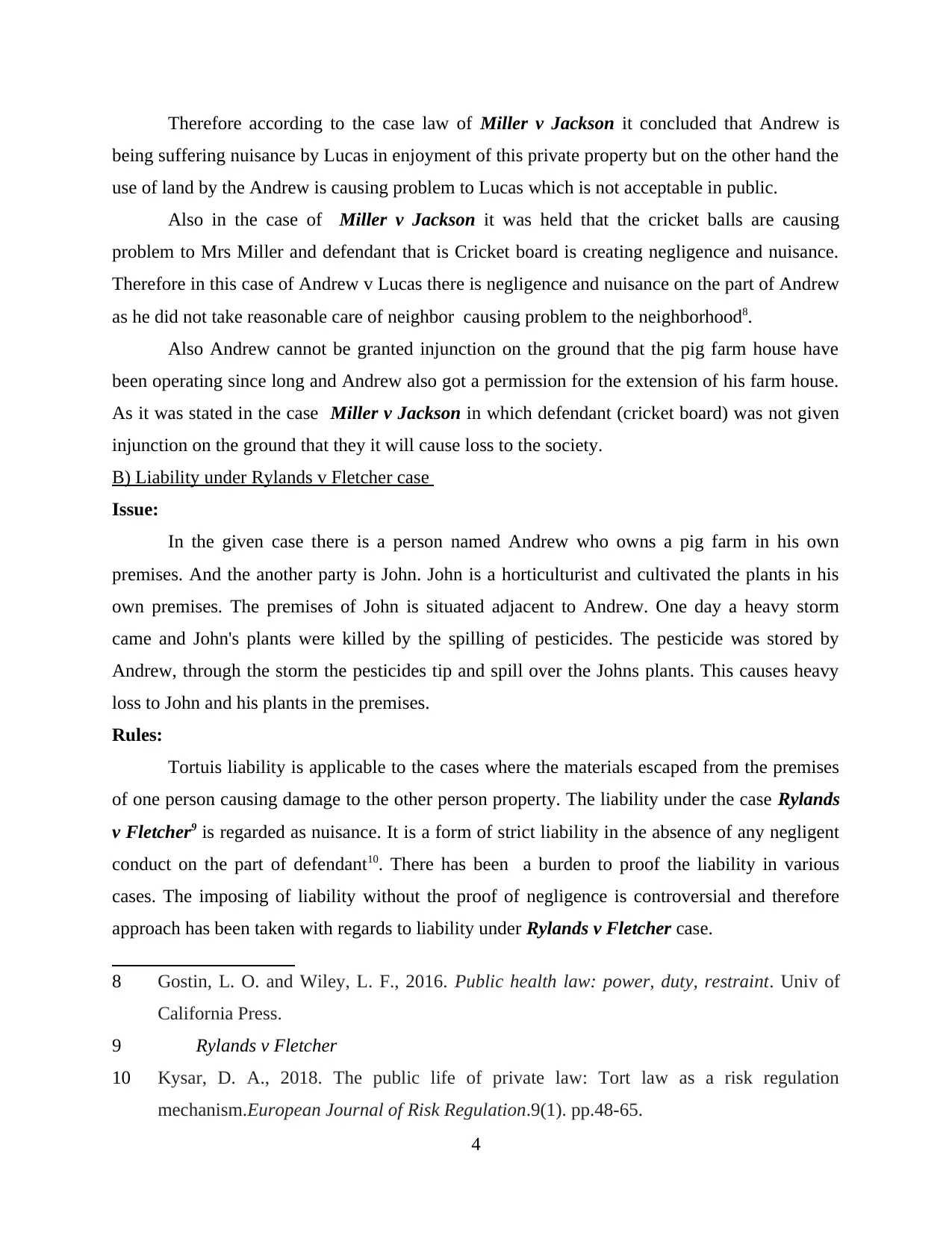
Therefore according to the case law of Miller v Jackson it concluded that Andrew is
being suffering nuisance by Lucas in enjoyment of this private property but on the other hand the
use of land by the Andrew is causing problem to Lucas which is not acceptable in public.
Also in the case of Miller v Jackson it was held that the cricket balls are causing
problem to Mrs Miller and defendant that is Cricket board is creating negligence and nuisance.
Therefore in this case of Andrew v Lucas there is negligence and nuisance on the part of Andrew
as he did not take reasonable care of neighbor causing problem to the neighborhood8.
Also Andrew cannot be granted injunction on the ground that the pig farm house have
been operating since long and Andrew also got a permission for the extension of his farm house.
As it was stated in the case Miller v Jackson in which defendant (cricket board) was not given
injunction on the ground that they it will cause loss to the society.
B) Liability under Rylands v Fletcher case
Issue:
In the given case there is a person named Andrew who owns a pig farm in his own
premises. And the another party is John. John is a horticulturist and cultivated the plants in his
own premises. The premises of John is situated adjacent to Andrew. One day a heavy storm
came and John's plants were killed by the spilling of pesticides. The pesticide was stored by
Andrew, through the storm the pesticides tip and spill over the Johns plants. This causes heavy
loss to John and his plants in the premises.
Rules:
Tortuis liability is applicable to the cases where the materials escaped from the premises
of one person causing damage to the other person property. The liability under the case Rylands
v Fletcher9 is regarded as nuisance. It is a form of strict liability in the absence of any negligent
conduct on the part of defendant10. There has been a burden to proof the liability in various
cases. The imposing of liability without the proof of negligence is controversial and therefore
approach has been taken with regards to liability under Rylands v Fletcher case.
8 Gostin, L. O. and Wiley, L. F., 2016. Public health law: power, duty, restraint. Univ of
California Press.
9 Rylands v Fletcher
10 Kysar, D. A., 2018. The public life of private law: Tort law as a risk regulation
mechanism.European Journal of Risk Regulation.9(1). pp.48-65.
4
being suffering nuisance by Lucas in enjoyment of this private property but on the other hand the
use of land by the Andrew is causing problem to Lucas which is not acceptable in public.
Also in the case of Miller v Jackson it was held that the cricket balls are causing
problem to Mrs Miller and defendant that is Cricket board is creating negligence and nuisance.
Therefore in this case of Andrew v Lucas there is negligence and nuisance on the part of Andrew
as he did not take reasonable care of neighbor causing problem to the neighborhood8.
Also Andrew cannot be granted injunction on the ground that the pig farm house have
been operating since long and Andrew also got a permission for the extension of his farm house.
As it was stated in the case Miller v Jackson in which defendant (cricket board) was not given
injunction on the ground that they it will cause loss to the society.
B) Liability under Rylands v Fletcher case
Issue:
In the given case there is a person named Andrew who owns a pig farm in his own
premises. And the another party is John. John is a horticulturist and cultivated the plants in his
own premises. The premises of John is situated adjacent to Andrew. One day a heavy storm
came and John's plants were killed by the spilling of pesticides. The pesticide was stored by
Andrew, through the storm the pesticides tip and spill over the Johns plants. This causes heavy
loss to John and his plants in the premises.
Rules:
Tortuis liability is applicable to the cases where the materials escaped from the premises
of one person causing damage to the other person property. The liability under the case Rylands
v Fletcher9 is regarded as nuisance. It is a form of strict liability in the absence of any negligent
conduct on the part of defendant10. There has been a burden to proof the liability in various
cases. The imposing of liability without the proof of negligence is controversial and therefore
approach has been taken with regards to liability under Rylands v Fletcher case.
8 Gostin, L. O. and Wiley, L. F., 2016. Public health law: power, duty, restraint. Univ of
California Press.
9 Rylands v Fletcher
10 Kysar, D. A., 2018. The public life of private law: Tort law as a risk regulation
mechanism.European Journal of Risk Regulation.9(1). pp.48-65.
4
⊘ This is a preview!⊘
Do you want full access?
Subscribe today to unlock all pages.

Trusted by 1+ million students worldwide
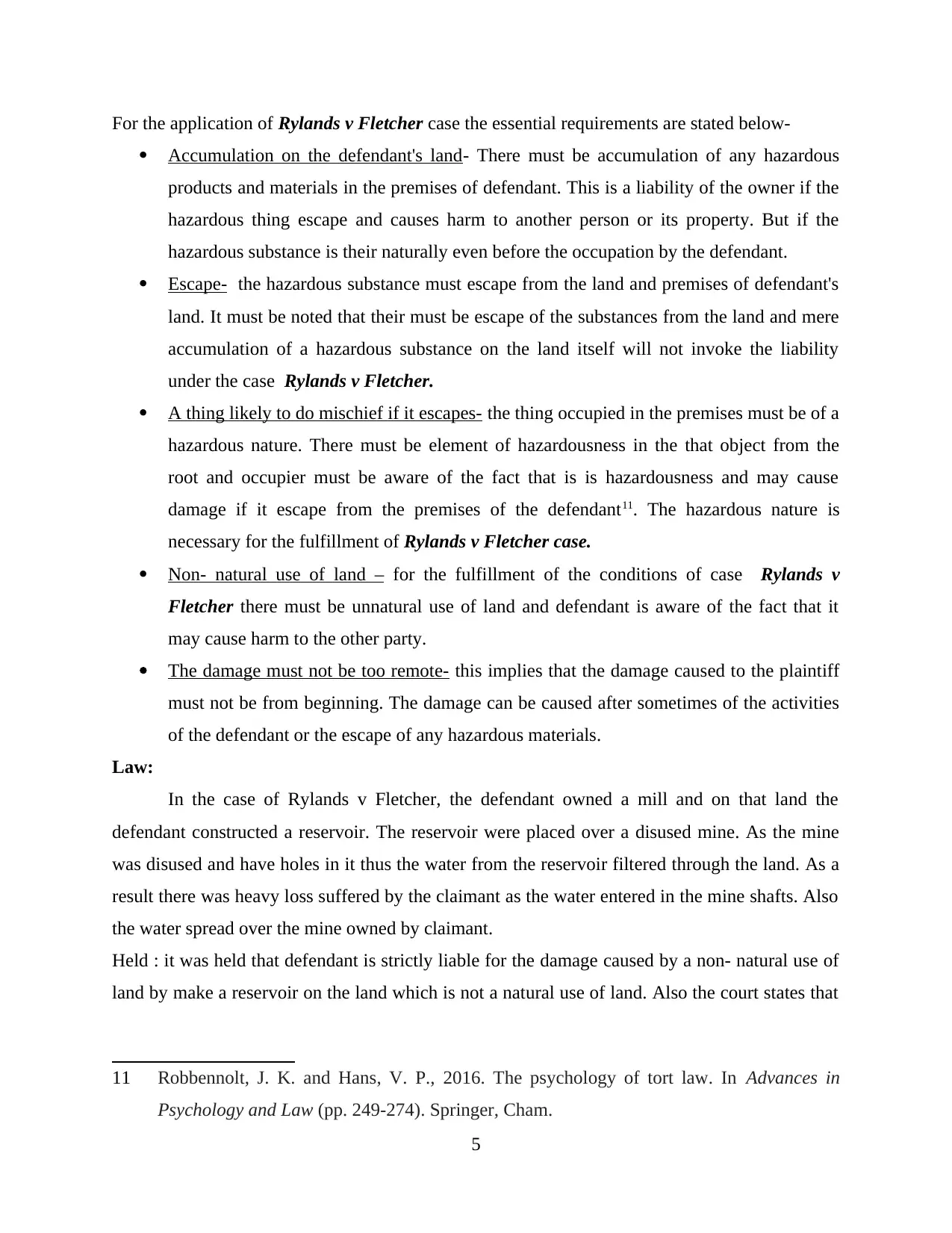
For the application of Rylands v Fletcher case the essential requirements are stated below-
Accumulation on the defendant's land- There must be accumulation of any hazardous
products and materials in the premises of defendant. This is a liability of the owner if the
hazardous thing escape and causes harm to another person or its property. But if the
hazardous substance is their naturally even before the occupation by the defendant.
Escape- the hazardous substance must escape from the land and premises of defendant's
land. It must be noted that their must be escape of the substances from the land and mere
accumulation of a hazardous substance on the land itself will not invoke the liability
under the case Rylands v Fletcher.
A thing likely to do mischief if it escapes- the thing occupied in the premises must be of a
hazardous nature. There must be element of hazardousness in the that object from the
root and occupier must be aware of the fact that is is hazardousness and may cause
damage if it escape from the premises of the defendant11. The hazardous nature is
necessary for the fulfillment of Rylands v Fletcher case.
Non- natural use of land – for the fulfillment of the conditions of case Rylands v
Fletcher there must be unnatural use of land and defendant is aware of the fact that it
may cause harm to the other party.
The damage must not be too remote- this implies that the damage caused to the plaintiff
must not be from beginning. The damage can be caused after sometimes of the activities
of the defendant or the escape of any hazardous materials.
Law:
In the case of Rylands v Fletcher, the defendant owned a mill and on that land the
defendant constructed a reservoir. The reservoir were placed over a disused mine. As the mine
was disused and have holes in it thus the water from the reservoir filtered through the land. As a
result there was heavy loss suffered by the claimant as the water entered in the mine shafts. Also
the water spread over the mine owned by claimant.
Held : it was held that defendant is strictly liable for the damage caused by a non- natural use of
land by make a reservoir on the land which is not a natural use of land. Also the court states that
11 Robbennolt, J. K. and Hans, V. P., 2016. The psychology of tort law. In Advances in
Psychology and Law (pp. 249-274). Springer, Cham.
5
Accumulation on the defendant's land- There must be accumulation of any hazardous
products and materials in the premises of defendant. This is a liability of the owner if the
hazardous thing escape and causes harm to another person or its property. But if the
hazardous substance is their naturally even before the occupation by the defendant.
Escape- the hazardous substance must escape from the land and premises of defendant's
land. It must be noted that their must be escape of the substances from the land and mere
accumulation of a hazardous substance on the land itself will not invoke the liability
under the case Rylands v Fletcher.
A thing likely to do mischief if it escapes- the thing occupied in the premises must be of a
hazardous nature. There must be element of hazardousness in the that object from the
root and occupier must be aware of the fact that is is hazardousness and may cause
damage if it escape from the premises of the defendant11. The hazardous nature is
necessary for the fulfillment of Rylands v Fletcher case.
Non- natural use of land – for the fulfillment of the conditions of case Rylands v
Fletcher there must be unnatural use of land and defendant is aware of the fact that it
may cause harm to the other party.
The damage must not be too remote- this implies that the damage caused to the plaintiff
must not be from beginning. The damage can be caused after sometimes of the activities
of the defendant or the escape of any hazardous materials.
Law:
In the case of Rylands v Fletcher, the defendant owned a mill and on that land the
defendant constructed a reservoir. The reservoir were placed over a disused mine. As the mine
was disused and have holes in it thus the water from the reservoir filtered through the land. As a
result there was heavy loss suffered by the claimant as the water entered in the mine shafts. Also
the water spread over the mine owned by claimant.
Held : it was held that defendant is strictly liable for the damage caused by a non- natural use of
land by make a reservoir on the land which is not a natural use of land. Also the court states that
11 Robbennolt, J. K. and Hans, V. P., 2016. The psychology of tort law. In Advances in
Psychology and Law (pp. 249-274). Springer, Cham.
5
Paraphrase This Document
Need a fresh take? Get an instant paraphrase of this document with our AI Paraphraser
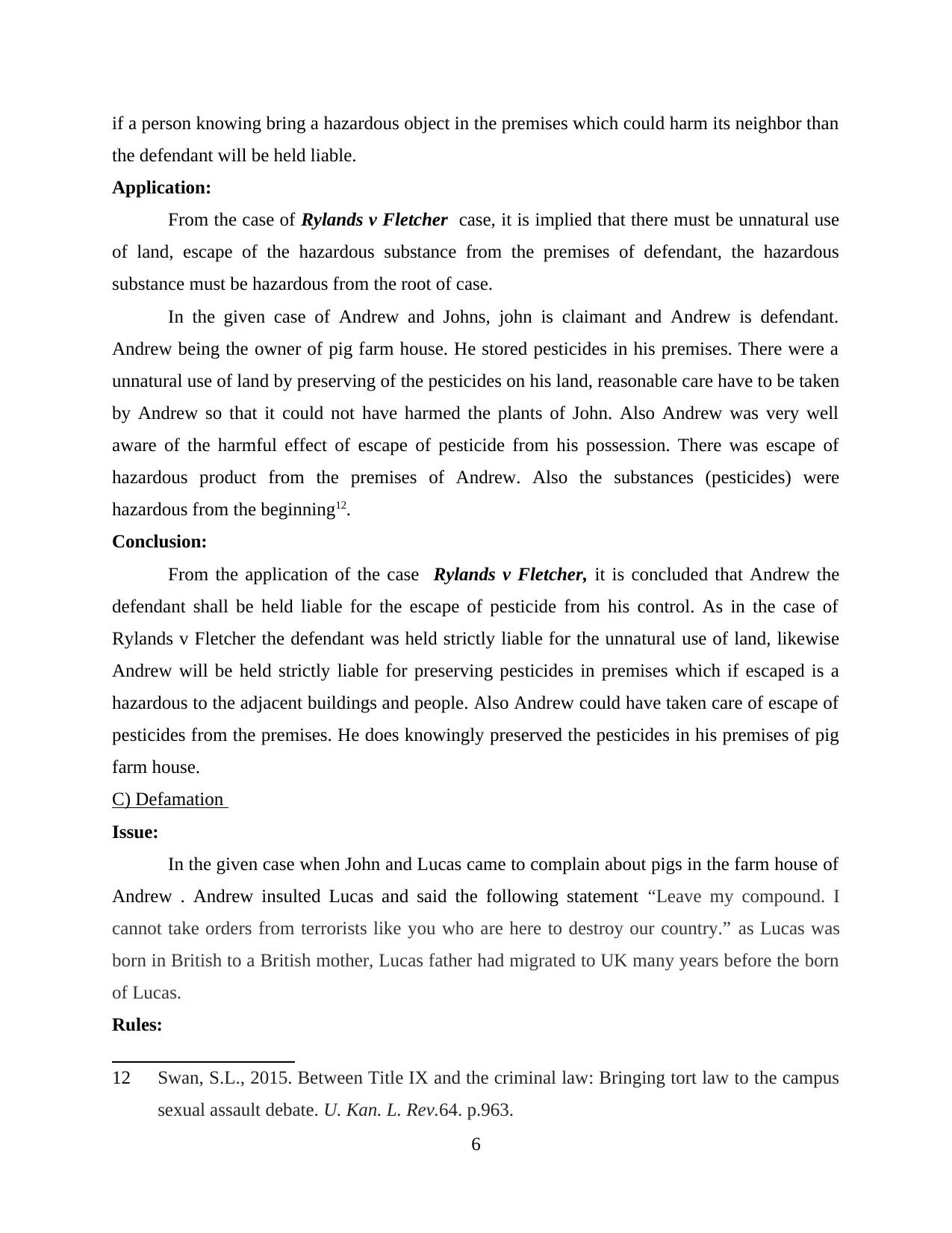
if a person knowing bring a hazardous object in the premises which could harm its neighbor than
the defendant will be held liable.
Application:
From the case of Rylands v Fletcher case, it is implied that there must be unnatural use
of land, escape of the hazardous substance from the premises of defendant, the hazardous
substance must be hazardous from the root of case.
In the given case of Andrew and Johns, john is claimant and Andrew is defendant.
Andrew being the owner of pig farm house. He stored pesticides in his premises. There were a
unnatural use of land by preserving of the pesticides on his land, reasonable care have to be taken
by Andrew so that it could not have harmed the plants of John. Also Andrew was very well
aware of the harmful effect of escape of pesticide from his possession. There was escape of
hazardous product from the premises of Andrew. Also the substances (pesticides) were
hazardous from the beginning12.
Conclusion:
From the application of the case Rylands v Fletcher, it is concluded that Andrew the
defendant shall be held liable for the escape of pesticide from his control. As in the case of
Rylands v Fletcher the defendant was held strictly liable for the unnatural use of land, likewise
Andrew will be held strictly liable for preserving pesticides in premises which if escaped is a
hazardous to the adjacent buildings and people. Also Andrew could have taken care of escape of
pesticides from the premises. He does knowingly preserved the pesticides in his premises of pig
farm house.
C) Defamation
Issue:
In the given case when John and Lucas came to complain about pigs in the farm house of
Andrew . Andrew insulted Lucas and said the following statement “Leave my compound. I
cannot take orders from terrorists like you who are here to destroy our country.” as Lucas was
born in British to a British mother, Lucas father had migrated to UK many years before the born
of Lucas.
Rules:
12 Swan, S.L., 2015. Between Title IX and the criminal law: Bringing tort law to the campus
sexual assault debate. U. Kan. L. Rev.64. p.963.
6
the defendant will be held liable.
Application:
From the case of Rylands v Fletcher case, it is implied that there must be unnatural use
of land, escape of the hazardous substance from the premises of defendant, the hazardous
substance must be hazardous from the root of case.
In the given case of Andrew and Johns, john is claimant and Andrew is defendant.
Andrew being the owner of pig farm house. He stored pesticides in his premises. There were a
unnatural use of land by preserving of the pesticides on his land, reasonable care have to be taken
by Andrew so that it could not have harmed the plants of John. Also Andrew was very well
aware of the harmful effect of escape of pesticide from his possession. There was escape of
hazardous product from the premises of Andrew. Also the substances (pesticides) were
hazardous from the beginning12.
Conclusion:
From the application of the case Rylands v Fletcher, it is concluded that Andrew the
defendant shall be held liable for the escape of pesticide from his control. As in the case of
Rylands v Fletcher the defendant was held strictly liable for the unnatural use of land, likewise
Andrew will be held strictly liable for preserving pesticides in premises which if escaped is a
hazardous to the adjacent buildings and people. Also Andrew could have taken care of escape of
pesticides from the premises. He does knowingly preserved the pesticides in his premises of pig
farm house.
C) Defamation
Issue:
In the given case when John and Lucas came to complain about pigs in the farm house of
Andrew . Andrew insulted Lucas and said the following statement “Leave my compound. I
cannot take orders from terrorists like you who are here to destroy our country.” as Lucas was
born in British to a British mother, Lucas father had migrated to UK many years before the born
of Lucas.
Rules:
12 Swan, S.L., 2015. Between Title IX and the criminal law: Bringing tort law to the campus
sexual assault debate. U. Kan. L. Rev.64. p.963.
6
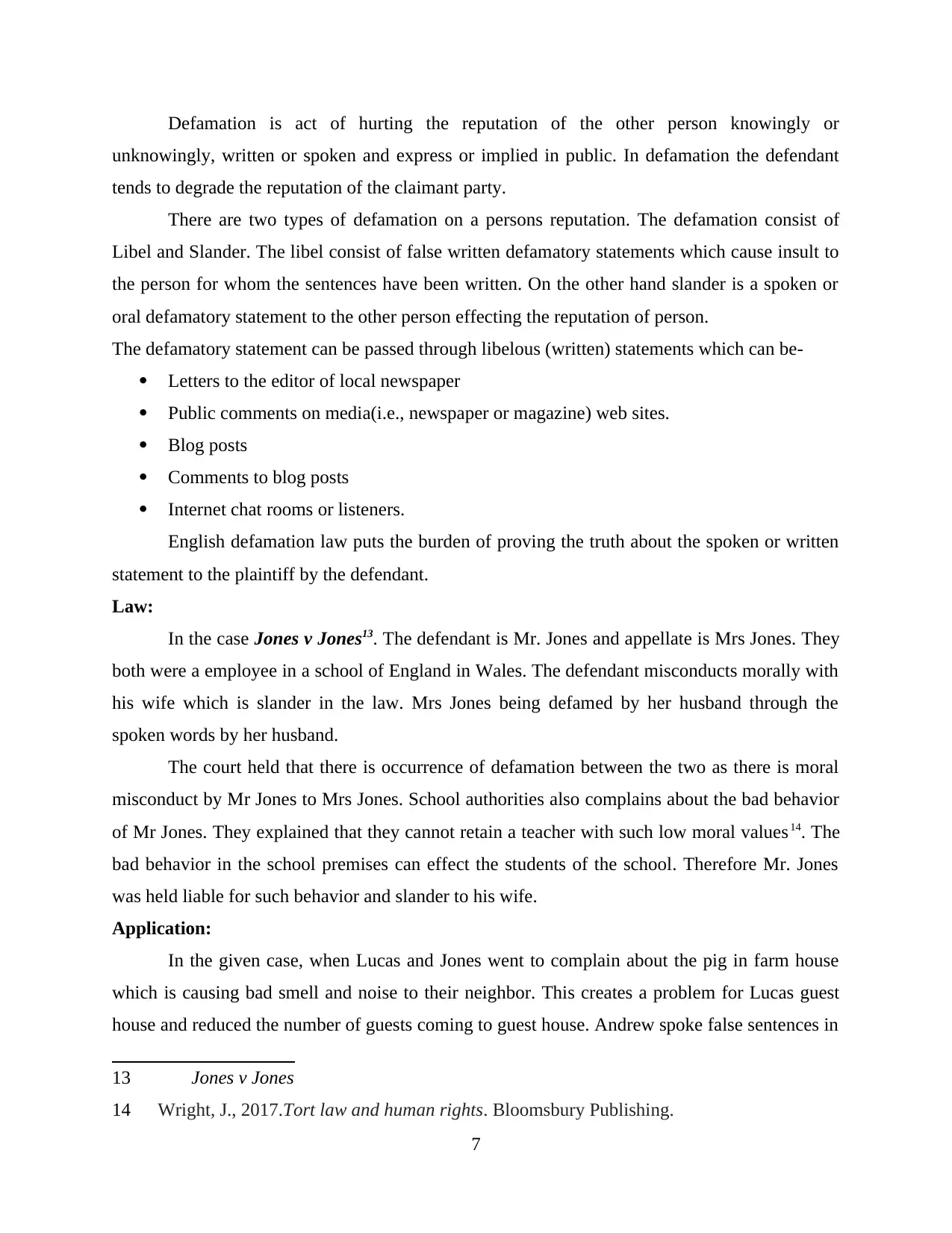
Defamation is act of hurting the reputation of the other person knowingly or
unknowingly, written or spoken and express or implied in public. In defamation the defendant
tends to degrade the reputation of the claimant party.
There are two types of defamation on a persons reputation. The defamation consist of
Libel and Slander. The libel consist of false written defamatory statements which cause insult to
the person for whom the sentences have been written. On the other hand slander is a spoken or
oral defamatory statement to the other person effecting the reputation of person.
The defamatory statement can be passed through libelous (written) statements which can be-
Letters to the editor of local newspaper
Public comments on media(i.e., newspaper or magazine) web sites.
Blog posts
Comments to blog posts
Internet chat rooms or listeners.
English defamation law puts the burden of proving the truth about the spoken or written
statement to the plaintiff by the defendant.
Law:
In the case Jones v Jones13. The defendant is Mr. Jones and appellate is Mrs Jones. They
both were a employee in a school of England in Wales. The defendant misconducts morally with
his wife which is slander in the law. Mrs Jones being defamed by her husband through the
spoken words by her husband.
The court held that there is occurrence of defamation between the two as there is moral
misconduct by Mr Jones to Mrs Jones. School authorities also complains about the bad behavior
of Mr Jones. They explained that they cannot retain a teacher with such low moral values14. The
bad behavior in the school premises can effect the students of the school. Therefore Mr. Jones
was held liable for such behavior and slander to his wife.
Application:
In the given case, when Lucas and Jones went to complain about the pig in farm house
which is causing bad smell and noise to their neighbor. This creates a problem for Lucas guest
house and reduced the number of guests coming to guest house. Andrew spoke false sentences in
13 Jones v Jones
14 Wright, J., 2017.Tort law and human rights. Bloomsbury Publishing.
7
unknowingly, written or spoken and express or implied in public. In defamation the defendant
tends to degrade the reputation of the claimant party.
There are two types of defamation on a persons reputation. The defamation consist of
Libel and Slander. The libel consist of false written defamatory statements which cause insult to
the person for whom the sentences have been written. On the other hand slander is a spoken or
oral defamatory statement to the other person effecting the reputation of person.
The defamatory statement can be passed through libelous (written) statements which can be-
Letters to the editor of local newspaper
Public comments on media(i.e., newspaper or magazine) web sites.
Blog posts
Comments to blog posts
Internet chat rooms or listeners.
English defamation law puts the burden of proving the truth about the spoken or written
statement to the plaintiff by the defendant.
Law:
In the case Jones v Jones13. The defendant is Mr. Jones and appellate is Mrs Jones. They
both were a employee in a school of England in Wales. The defendant misconducts morally with
his wife which is slander in the law. Mrs Jones being defamed by her husband through the
spoken words by her husband.
The court held that there is occurrence of defamation between the two as there is moral
misconduct by Mr Jones to Mrs Jones. School authorities also complains about the bad behavior
of Mr Jones. They explained that they cannot retain a teacher with such low moral values14. The
bad behavior in the school premises can effect the students of the school. Therefore Mr. Jones
was held liable for such behavior and slander to his wife.
Application:
In the given case, when Lucas and Jones went to complain about the pig in farm house
which is causing bad smell and noise to their neighbor. This creates a problem for Lucas guest
house and reduced the number of guests coming to guest house. Andrew spoke false sentences in
13 Jones v Jones
14 Wright, J., 2017.Tort law and human rights. Bloomsbury Publishing.
7
⊘ This is a preview!⊘
Do you want full access?
Subscribe today to unlock all pages.

Trusted by 1+ million students worldwide
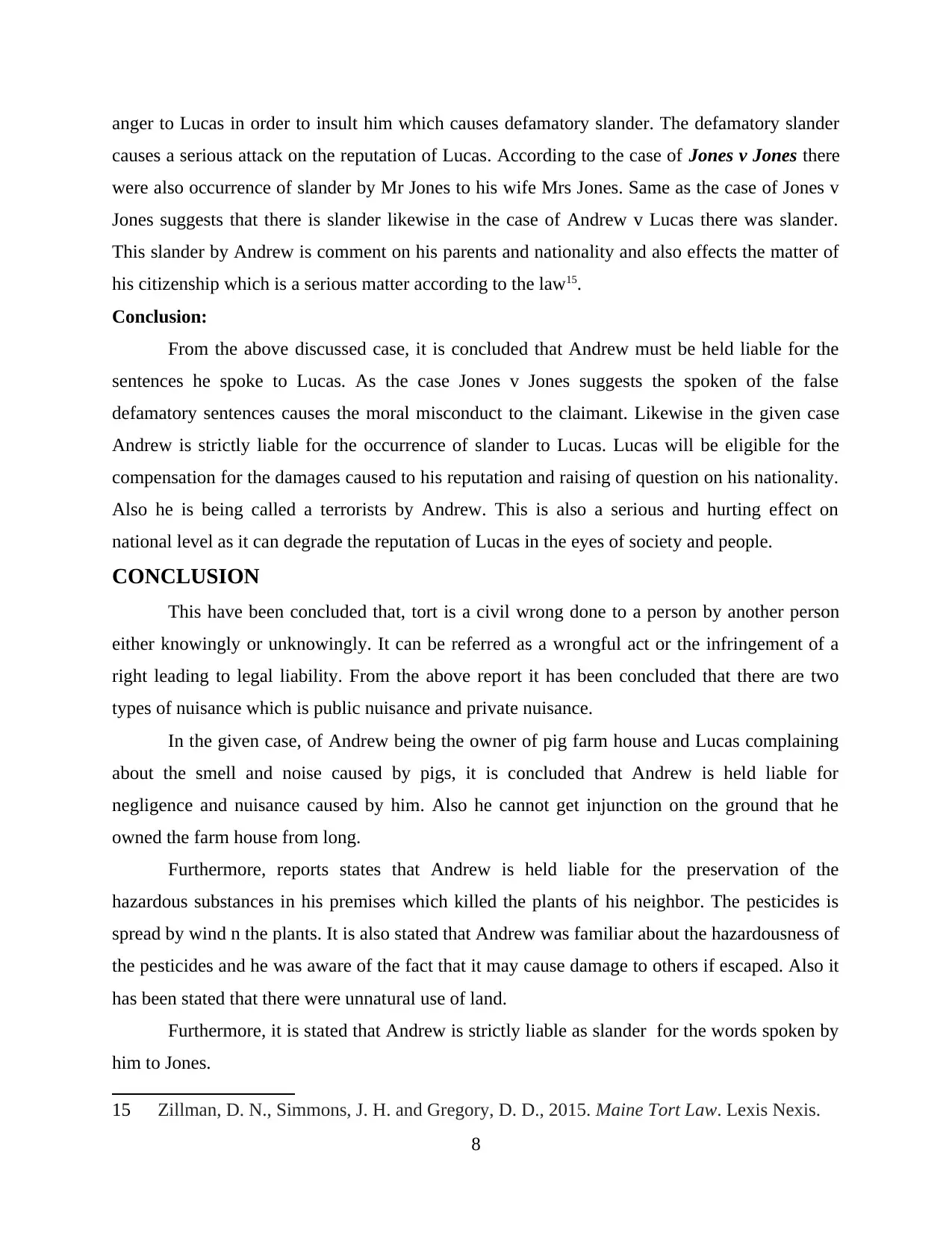
anger to Lucas in order to insult him which causes defamatory slander. The defamatory slander
causes a serious attack on the reputation of Lucas. According to the case of Jones v Jones there
were also occurrence of slander by Mr Jones to his wife Mrs Jones. Same as the case of Jones v
Jones suggests that there is slander likewise in the case of Andrew v Lucas there was slander.
This slander by Andrew is comment on his parents and nationality and also effects the matter of
his citizenship which is a serious matter according to the law15.
Conclusion:
From the above discussed case, it is concluded that Andrew must be held liable for the
sentences he spoke to Lucas. As the case Jones v Jones suggests the spoken of the false
defamatory sentences causes the moral misconduct to the claimant. Likewise in the given case
Andrew is strictly liable for the occurrence of slander to Lucas. Lucas will be eligible for the
compensation for the damages caused to his reputation and raising of question on his nationality.
Also he is being called a terrorists by Andrew. This is also a serious and hurting effect on
national level as it can degrade the reputation of Lucas in the eyes of society and people.
CONCLUSION
This have been concluded that, tort is a civil wrong done to a person by another person
either knowingly or unknowingly. It can be referred as a wrongful act or the infringement of a
right leading to legal liability. From the above report it has been concluded that there are two
types of nuisance which is public nuisance and private nuisance.
In the given case, of Andrew being the owner of pig farm house and Lucas complaining
about the smell and noise caused by pigs, it is concluded that Andrew is held liable for
negligence and nuisance caused by him. Also he cannot get injunction on the ground that he
owned the farm house from long.
Furthermore, reports states that Andrew is held liable for the preservation of the
hazardous substances in his premises which killed the plants of his neighbor. The pesticides is
spread by wind n the plants. It is also stated that Andrew was familiar about the hazardousness of
the pesticides and he was aware of the fact that it may cause damage to others if escaped. Also it
has been stated that there were unnatural use of land.
Furthermore, it is stated that Andrew is strictly liable as slander for the words spoken by
him to Jones.
15 Zillman, D. N., Simmons, J. H. and Gregory, D. D., 2015. Maine Tort Law. Lexis Nexis.
8
causes a serious attack on the reputation of Lucas. According to the case of Jones v Jones there
were also occurrence of slander by Mr Jones to his wife Mrs Jones. Same as the case of Jones v
Jones suggests that there is slander likewise in the case of Andrew v Lucas there was slander.
This slander by Andrew is comment on his parents and nationality and also effects the matter of
his citizenship which is a serious matter according to the law15.
Conclusion:
From the above discussed case, it is concluded that Andrew must be held liable for the
sentences he spoke to Lucas. As the case Jones v Jones suggests the spoken of the false
defamatory sentences causes the moral misconduct to the claimant. Likewise in the given case
Andrew is strictly liable for the occurrence of slander to Lucas. Lucas will be eligible for the
compensation for the damages caused to his reputation and raising of question on his nationality.
Also he is being called a terrorists by Andrew. This is also a serious and hurting effect on
national level as it can degrade the reputation of Lucas in the eyes of society and people.
CONCLUSION
This have been concluded that, tort is a civil wrong done to a person by another person
either knowingly or unknowingly. It can be referred as a wrongful act or the infringement of a
right leading to legal liability. From the above report it has been concluded that there are two
types of nuisance which is public nuisance and private nuisance.
In the given case, of Andrew being the owner of pig farm house and Lucas complaining
about the smell and noise caused by pigs, it is concluded that Andrew is held liable for
negligence and nuisance caused by him. Also he cannot get injunction on the ground that he
owned the farm house from long.
Furthermore, reports states that Andrew is held liable for the preservation of the
hazardous substances in his premises which killed the plants of his neighbor. The pesticides is
spread by wind n the plants. It is also stated that Andrew was familiar about the hazardousness of
the pesticides and he was aware of the fact that it may cause damage to others if escaped. Also it
has been stated that there were unnatural use of land.
Furthermore, it is stated that Andrew is strictly liable as slander for the words spoken by
him to Jones.
15 Zillman, D. N., Simmons, J. H. and Gregory, D. D., 2015. Maine Tort Law. Lexis Nexis.
8
Paraphrase This Document
Need a fresh take? Get an instant paraphrase of this document with our AI Paraphraser
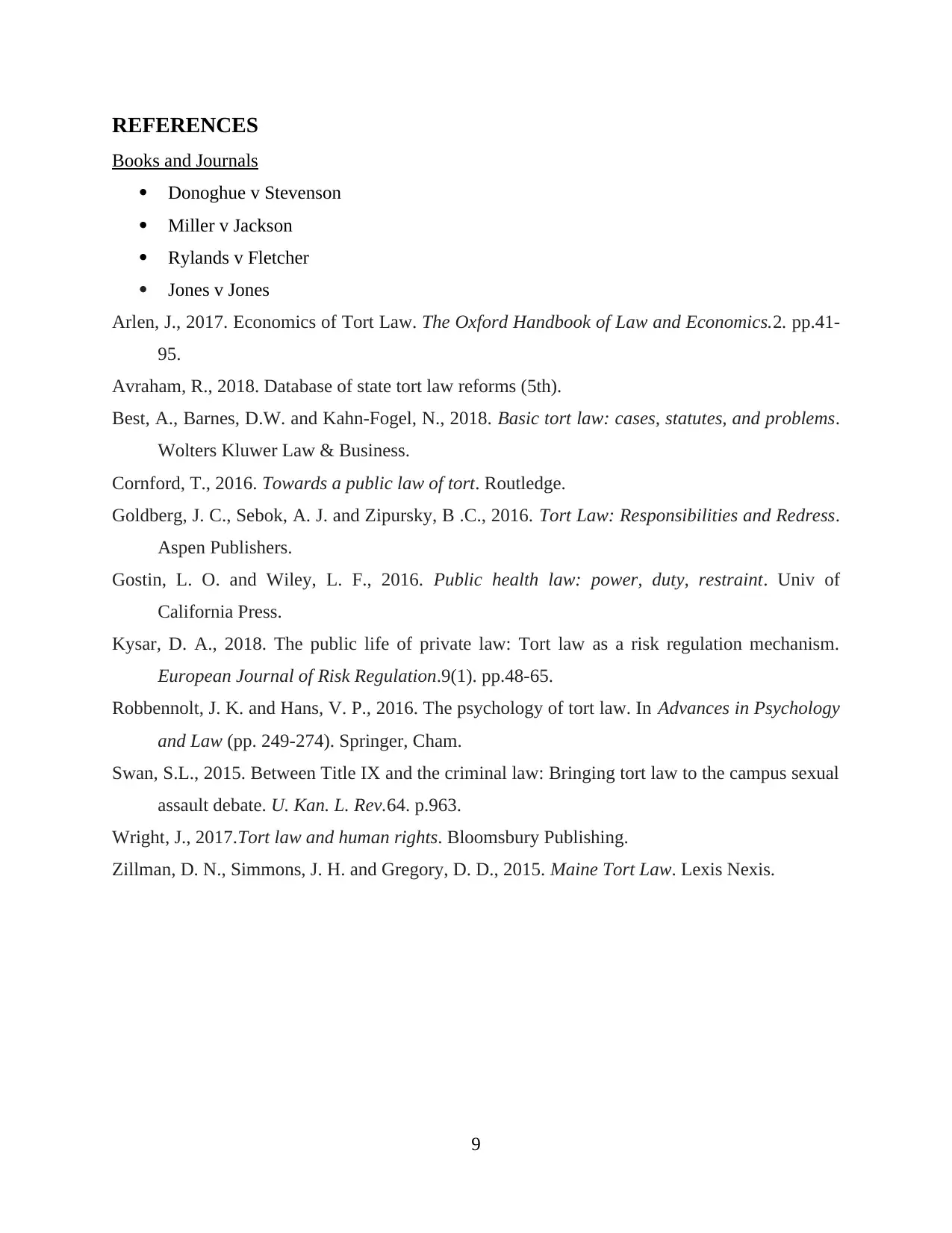
REFERENCES
Books and Journals
Donoghue v Stevenson
Miller v Jackson
Rylands v Fletcher
Jones v Jones
Arlen, J., 2017. Economics of Tort Law. The Oxford Handbook of Law and Economics.2. pp.41-
95.
Avraham, R., 2018. Database of state tort law reforms (5th).
Best, A., Barnes, D.W. and Kahn-Fogel, N., 2018. Basic tort law: cases, statutes, and problems.
Wolters Kluwer Law & Business.
Cornford, T., 2016. Towards a public law of tort. Routledge.
Goldberg, J. C., Sebok, A. J. and Zipursky, B .C., 2016. Tort Law: Responsibilities and Redress.
Aspen Publishers.
Gostin, L. O. and Wiley, L. F., 2016. Public health law: power, duty, restraint. Univ of
California Press.
Kysar, D. A., 2018. The public life of private law: Tort law as a risk regulation mechanism.
European Journal of Risk Regulation.9(1). pp.48-65.
Robbennolt, J. K. and Hans, V. P., 2016. The psychology of tort law. In Advances in Psychology
and Law (pp. 249-274). Springer, Cham.
Swan, S.L., 2015. Between Title IX and the criminal law: Bringing tort law to the campus sexual
assault debate. U. Kan. L. Rev.64. p.963.
Wright, J., 2017.Tort law and human rights. Bloomsbury Publishing.
Zillman, D. N., Simmons, J. H. and Gregory, D. D., 2015. Maine Tort Law. Lexis Nexis.
9
Books and Journals
Donoghue v Stevenson
Miller v Jackson
Rylands v Fletcher
Jones v Jones
Arlen, J., 2017. Economics of Tort Law. The Oxford Handbook of Law and Economics.2. pp.41-
95.
Avraham, R., 2018. Database of state tort law reforms (5th).
Best, A., Barnes, D.W. and Kahn-Fogel, N., 2018. Basic tort law: cases, statutes, and problems.
Wolters Kluwer Law & Business.
Cornford, T., 2016. Towards a public law of tort. Routledge.
Goldberg, J. C., Sebok, A. J. and Zipursky, B .C., 2016. Tort Law: Responsibilities and Redress.
Aspen Publishers.
Gostin, L. O. and Wiley, L. F., 2016. Public health law: power, duty, restraint. Univ of
California Press.
Kysar, D. A., 2018. The public life of private law: Tort law as a risk regulation mechanism.
European Journal of Risk Regulation.9(1). pp.48-65.
Robbennolt, J. K. and Hans, V. P., 2016. The psychology of tort law. In Advances in Psychology
and Law (pp. 249-274). Springer, Cham.
Swan, S.L., 2015. Between Title IX and the criminal law: Bringing tort law to the campus sexual
assault debate. U. Kan. L. Rev.64. p.963.
Wright, J., 2017.Tort law and human rights. Bloomsbury Publishing.
Zillman, D. N., Simmons, J. H. and Gregory, D. D., 2015. Maine Tort Law. Lexis Nexis.
9
1 out of 11
Related Documents
Your All-in-One AI-Powered Toolkit for Academic Success.
+13062052269
info@desklib.com
Available 24*7 on WhatsApp / Email
![[object Object]](/_next/static/media/star-bottom.7253800d.svg)
Unlock your academic potential
Copyright © 2020–2025 A2Z Services. All Rights Reserved. Developed and managed by ZUCOL.





